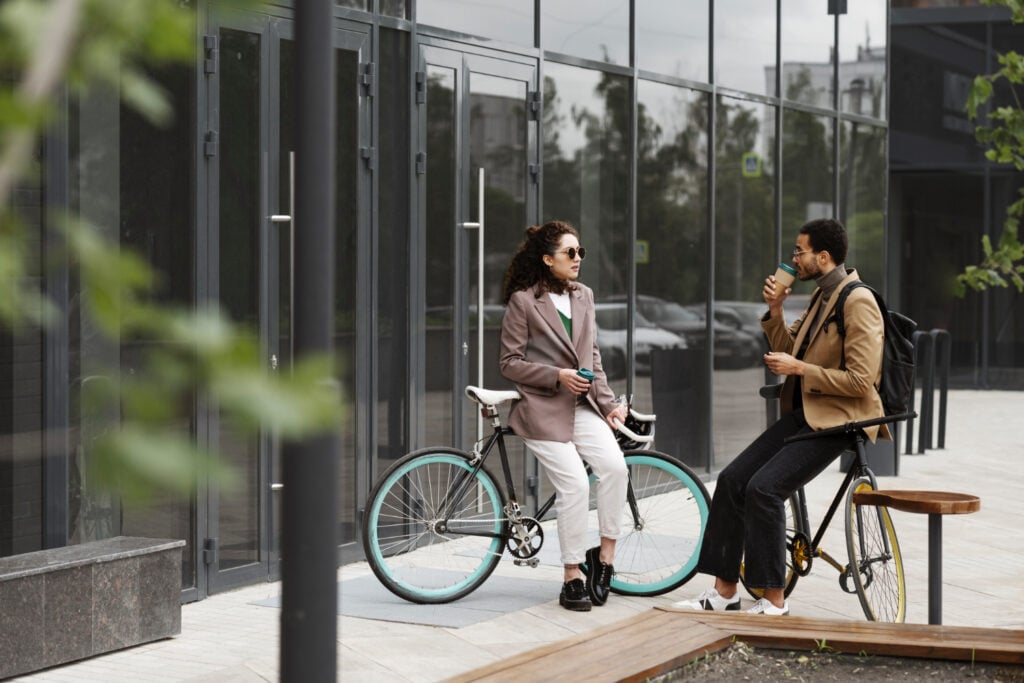
It may seem like an easy route; find a job, snap up an easy visa, and maybe even have your employer pay for your relocation costs to Holland.
In practice — unfortunately, it’s not that easy.
Sponsored jobs are few and far between in the Netherlands, thanks to a highly proficient workforce of Dutchies and a work pool that includes almost the entire European Union.
However, don’t despair. It is possible to find success in landing a sponsored job in the Netherlands — here’s how.
We teamed up with our friends at Undutchables for this article because they’re the experts when it comes to getting employed in the Netherlands! If you’re looking for a job in the Netherlands, we highly recommend getting in touch. 🇳🇱 🎉
Let’s start with the basics. A sponsored job is employment where your employer also helps you to gain a work visa.
Essentially, a company, university, or research institution in the Netherlands wants you, an international, to come and work for them.
This employer loves you so much and thinks you’ll do such an amazing job that they’re willing to vouch for you at immigration just to get you a visa to work in the country.
Pretty sweet deal, right?

But there is one main caveat: in the Netherlands, not every employer can sponsor someone for a job. In most cases, they first must be considered a recognised sponsor by the Dutch immigration department (IND).
We’ll tell you exactly what a “recognised sponsor” is (and how to find one) later.
Snapping up a sponsored job in the Netherlands will generally make your life much easier compared to taking another visa route (unless you’re from an EU/EEA country or Switzerland).
To start, if you become employed by a recognised sponsor, you’ll enjoy a fast-tracked application for your work visa from the IND (Dutch Immigration Department). It will also only take around two weeks to get a visa instead of three months!
For you, that means less waiting around to get your visa and a quicker chance to jump straight into your new job (and new Dutch life!)
There are other benefits, too. For example, if you arrive to work for a recognised sponsor and you’re considered a Highly Skilled Migrant or have a European Blue Card, your employer has to give you a pretty decent wage:
| Visa/Permit Type | Minimum salary in 2024 (excl. 8% holiday pay) |
|---|---|
| Highly skilled migrants 30 years or older | €5,331 gross per month |
| Highly skilled migrants younger than 30 years | €3,909 gross per month |
| Reduced salary criterion for foreign graduates | €2,801 gross per month |
| Reduced salary criterion for essential start-up personnel | €2,631 gross per month |
| European Blue Card | €6,245 gross per month |
Compare those numbers to the Dutch minimum wage of €2,317 gross per month in 2024 (based on 40 hours per week), and you have yourself a pretty attractive salary!
This is the bad news — it’s not particularly easy to land a sponsored job in the Netherlands.
Some jobs are easier than others. For example, au pairs often work through an agency that is a recognised sponsor, and there are typically more jobs available for au pairs than for other professions.

However, if you’re in a field with a lot of competition, particularly in the local market, some employers don’t want to apply for sponsorship when they have a willing market of workers right in front of them.
Considering the Schengen agreement made it possible for anyone in the Schengen Zone (26 European countries!) to live and work in the Netherlands, this (unfortunately) happens more often than you might think.
However, if you think you’ve got a competitive edge or are trained in a much-needed workforce, you may have better luck. So what options will you have? Let’s take a look.
Want a head start in finding the perfect non-Dutch speaking job in the Netherlands? Check out Undutchables ! They’re the expert recruitment agency for internationals in the Netherlands and are super helpful for anything to do with working in Holland. Search for a job in the Netherlands here.
A highly skilled migrant (HSM) visa is one of the most common options for sponsored jobs in the Netherlands.
This visa is for people who are not from the EU, Liechtenstein, Norway, Iceland, or Switzerland, but who are highly educated, and who are deemed to contribute to the Dutch knowledge-based economy. For example (but not limited to), a university lecturer, an IT project manager, a scientific researcher, or a doctor in training.
To be eligible as a highly-skilled migrant, the migrant needs to:
💡 TIP: Are you in a field that is considered in high demand in the Netherlands? If you’re recruited from abroad (before you live in the country), you might be eligible for the 30% ruling where you receive great tax benefits! Read more.
If you don’t qualify as a highly-skilled migrant, your employer can also apply under other paid employment — or andere arbeid in loondienst .
This is difficult because the employer must prove that no one in the local labour market can fill the position they are offering you.
The IND will seek confirmation of this from the UWV (Employee Insurance Agency). If the UWV decides that there are suitable job seekers in the Netherlands for the position, it will advise the IND of this — and your application will be rejected. Ouch!
However, there are some exceptions to the labour market test. For example, top athletes, spiritual ministers, musicians, or chefs for Asian restaurants need a residence permit, but don’t need to be referred to the UWV.

If you find that you’re not eligible for a highly skilled migrant visa or a different paid employment visa, don’t stress. You can also consider:
We’ve been throwing around this “recognised sponsor” term throughout this article, so you’ve probably figured it’s pretty essential — and you’re correct.
A recognised sponsor is an organisation who has applied to and been accepted by the IND and therefore benefits from streamlined visa applications for their international employees.
If you’re applying as a highly-skilled migrant or a researcher, your employer must be a recognised sponsor.

However, if you apply as an Intra Corporate Transferee, European Blue Card, or for other work in paid employment, your employer doesn’t need to be a recognised sponsor , but can just be a sponsor .
There are plenty of recognised sponsors already. According to the IND, there are:
Some major companies or companies that hire internationals regularly may already be a recognised sponsor. Otherwise, they need to apply, be approved, and pay a significant fee.
Almost any company can apply to be a recognised sponsor, but they do have to fulfil some requirements.
There’s a long list of conditions to become a recognised sponsor , including things like being listed on the Commercial Register and being in good financial standing.
There’s also a hefty fee — €4,560 in 2024. However, that fee is reduced to just €2,279 if the company has less than 50 employees.
Actually, no. If you want to be sponsored for a job in the Netherlands, your employer doesn’t have to be the registered sponsor. Instead, you can go through a payroll company, or in some rarer cases, a recruitment agency.
A payroll company is a company that “hires” you on behalf of your actual employer.
They often offer administrative support and can be a great workaround for arranging visa, tax, or payroll requirements that your company is not able to provide.
Your potential employer may suggest using a payroll company, or you could also suggest it as an option.

These companies act as your employer, apply to the IND as a recognised sponsor, and then have a contract with the company you want to work with for you to work at that company instead.
Of course, there are some fees involved with this, so you and the company should keep this in mind if you choose this option .
Recruitment agencies generally work in a similar way once you have been hired. However, getting a sponsored job directly through your recruitment agency is less common.
While payroll companies can add you to the administration after you’ve come to an agreement with a new employer, recruitment agencies are responsible for the entire hiring process and must be involved with matching you with your new employer from the start.
There are thousands of companies that are already recognised sponsors by the IND. These include major companies like Allianz, Booking.com, bunq, Shell, Johnson & Johnson, and Netflix.
If you’re curious to know if your potential company is already a recognised sponsor, you can check out the IND’s Public Register to find full lists of recognised sponsors in the Netherlands.
If none of the above options tickled your fancy, don’t stress. Even if you can’t land a sponsored job, there are still plenty of other visa options to work in the Netherlands .
Were you lucky enough to land a sponsored job in the Netherlands? Share your experience in the comments below!
To get a sponsored job in the Netherlands, you’ll need to first find a company that is authorised to sponsor your visa. You can apply to that company for a job, then they’ll submit your paperwork to the Dutch immigration department.
Yes! Companies in the Netherlands can sponsor workers to come to the country. There are certain conditions placed on this, like higher minimum salaries and sometimes a requirement that the job is so specialised someone already living in the Netherlands can’t perform the same job.
A foreigner can get a job in the Netherlands by getting a visa that allows them to work in the country. This could be a highly-skilled migrant visa, a European Blue Card, a Zoekjaar (Search Year) visa, or more.
There are over 9,000 companies that can sponsor a visa for workers abroad. Some of the biggest ones include Allianz, Booking.com, bunq, Shell, Johnson & Johnson, and Netflix .
To apply for a standard work permit in the Netherlands as a non-EU/EEA/or Swiss citizen, you’ll typically need a job offer first.
There are a few exceptions though, like the zoekjaar visa that allows you to stay and work in the Netherlands for up to a year while looking for work after graduating from a Dutch university or a recognized foreign institute of higher education, or a Working Holiday Visa if you’re under the age limit and part of an authorised country.
You can also check the IND website to see if another permit application applies to your situation (i.e., family and partner or asylum permits).
Feature Image: Freepik (Modified) Previous article Next articleSam has over six years experience writing about life in the Netherlands and leads the content team at DutchReview. She originally came to the Netherlands to study in 2016 and now holds a BA (Hons.) in Arts, a BA (Hons) in Journalism, and (almost) a Masters in Teaching. She loves to write about settling into life in the Netherlands, her city of Utrecht, learning Dutch, and jobs in the Netherlands — and she still can’t jump on the back of a moving bike (she's learning!).
The 30% ruling in the Netherlands — if you’re an expat here or planning to become one, you’ve probably heard.
Lyna Meyrer 🇱🇺 - September 2, 2024Dutch savings accounts have increased their interest rates in recent years, but to get the best interest rate for your.
DutchReview Crew - September 2, 2024Hold up — sororities and fraternities in the Netherlands? Isn’t that an American thing? Well, it’s complicated, but there is.